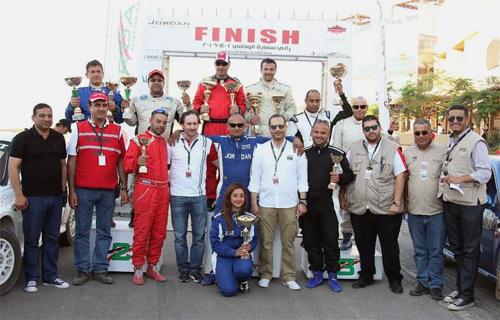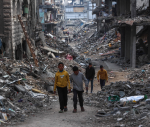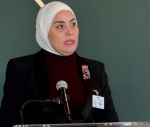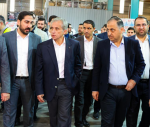You are here
Decentralisation chance for ‘grassroots decision making’ — Jerash residents
By Ahmed Bani Mustafa - Aug 08,2017 - Last updated at Aug 08,2017

Jerash residents say the governorate councils will be ‘more capable’ than central government planners to decide on priority development projects (Photo by Ahmad Bani Mustafa)
JERASH — The governorate councils will be “more capable” than central government planners to decide on priority development projects, residents from Jerash told The Jordan Times on Tuesday.
Voters in Jerash, 45km north of Amman, expressed keenness to choose their representatives for the governorate councils during the upcoming elections, which will be held for the first time in the history of Jordan.
The elections, slated for August 15, will include electing mayors and members of local and municipal councils, as well as the new governorate councils, which will be elected according to the new Decentralisation Law.
Najah Otoum, a resident of the city, said that she will vote for any candidate who has a “clear” programme that includes plans to create more jobs in the city and improve infrastructure and the provision of public services.
“My choice will not be based on tribal connections, but on the candidates who I think will be able to take responsibility,” she added.
Maaen Kurdi, a Jerash resident, said that decentralisation will allow the decision making process to start from the grassroots up to the central government, where decisions are made in response to citizens’ priorities in their respective locations.
Kurdi, who is a lawyer, said that the governorate councils will enhance people’s participation in deciding on development projects, “without relying on planners from outside their regions, who build their strategies on what they think residents want”.
“The city of Jerash needs effective plans to deal with traffic congestion, which has become a major challenge for residents”, according to Kurdi.
Dalal Bakeer, a candidate, said that she will work on investing in what the city is well-known for, such as tourism and food products.
“Jerashians” need to better benefit from the existence of the famous ancient Roman city of Jerash, she said.
“The development projects have to be sustainable and focused on improving the living standards of underprivileged families,” Bakeer concluded.
Ehab Nizami, a Jerash first-district candidate, said that he chose to run for the governorates councils’ elections because of his “good” knowledge, as he has followed up on the decentralisation project since it was first mentioned by His Majesty King Abdullah in 2004.
The decentralisation system is an “ideal” approach to save public funds and direct them to the “most necessary” development projects, Nizami said.
Several previous projects have “proved” the need for domestic participation, as those projects were “not studied correctly” and resulted in “wasting” public funds and causing additional problems, according to the candidate.
“The government had to build a new bus station, as the previous one was too far and was eventually abandoned,” said Nizami.
“Jerash was planted with hundreds of date-palm trees, which was not in keeping with the Mediterranean climate of the town,” he added.
Kamel Qadiri, a candidate, said that, for him, “decentralisation is the delegation of governorate councils to agree on or reject development projects according to local residents’’ priorities.
Qadiri, who worked as lawyer and a teacher, said that the members of the councils will be able to revise previous projects and decide on their benefits to the local community.
He said that he is relying on his “social influence” to be elected, through both his tribe and the personal connections he made through his previous jobs.
Some 108,193 people are eligible to vote in Jerash, around 45km north of Amman, including 59,920 women and 48,273 men.
The governorate is divided into seven districts, with 19 seats, of which two seats are allocated as a quota for women.
| District | Number of seats | Number of voters | Number of candidates |
1st | Jerash and Kufier municipality | 4 | 47,204 | 16 |
2nd | Souf | 2 | 9, 833 | 4 |
3rd | Outskirts of Jerash | 1 | 9, 101 | 5 |
4th | Mirad | 4 | 20, 348 | 8 |
5th | Bab Amman | 2 | 7,630 | 11 |
6th | Nasim | 2 | 13, 064 | 11 |
7th | Burma | 2 | 7,027 | 8 |
Source: Independent Election Commission
Related Articles
DEAD SEA — Khaled Juma on Friday was crowned champion of the first round of the Jordan Rally Championship “Samarah Rally” held with the part
AMMAN — His Majesty King Abdullah has sent a cable to UAE President Sheikh Khalifa Bin Zayed Al Nahyan, expressing condolences over the pa
AMMAN — Jordan’s Wihdat and Faisali will play their stage two Asian Football Confederation (AFC) Cup on Tuesday with both teams aiming to co

















